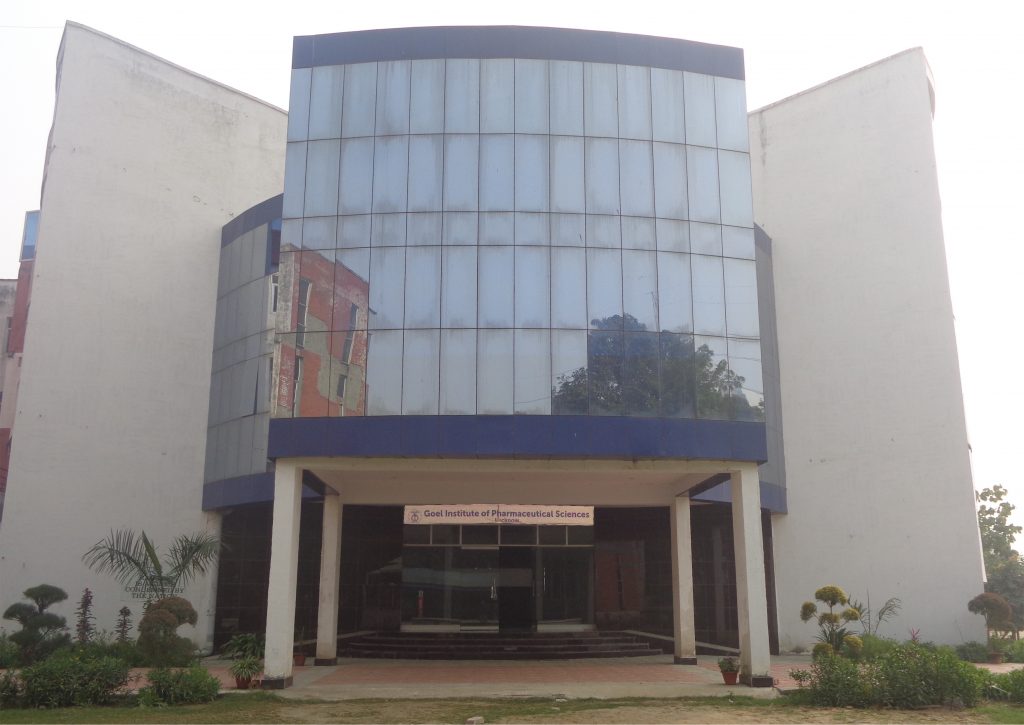Goel institute of pharmaceutical sciences was established by the Roop Chand Ramji Lal Education Trust. It is located near the heart of the city and far from hustle and bustle free environment. It has started its first academic session from year 2019 with four – year Bachelors program in Pharmacy (B. Pharm) and two – years Diploma program in Pharmacy (D. Pharm). Institute is affiliated to the Dr. A.P.J Abdul Kalam Technical University (AKTU), Lucknow & approved by the AICTE, Pharmacy Council of India (PCI), New Delhi and Board of technical education (BTE), UP. The aim of the forum is to develop a sense of devotion towards their profession by organizing various blood donation camps, rural visits for awareness of health etc. We are committed to the betterment of the students. We organize regular workshops, seminars, field work and industrial visits. The students are given individual attention and the laboratory infrastructure is sufficient to cater to the needs of the students. Institute has intellectual, dedicated and highly experienced faculty members for the academic progress of the students. The College is equipped with all the modern instruments and machinery to provide the best practical training to budding pharmacists. It also provides a healthy academic atmosphere to the students to achieve their goals.

Our Vision
To establish as a leading ”centre for excellence” in the area of ”Pharmaceutical Education and Research” and create globally efficient professionals to serve healthcare needs of the society.
Our Mission
- To produce efficient professionals catering to the needs of Industry, Academia, Research and society.
- To contribute our humble share to ensure the well being and to reduce the suffering of mankind.
Program Educational Objectives
- To prepare the students to excel in pharmaceutical industry and profession through quality and innovative teaching learning process.
- To build a sound foundation in science, mathematics and management principles to enable the students to grasp the core concepts of pharmaceutical science and technology.
- To inculcate high professional and ethical attitude in students along with strong communication skills, a multi- tasking approach and team spirit.
- To enhance student’s ability to analyze real life problems and provide viable solutions with design and development of socially relevant projects.
- To create a conducive environment for the students through strong industry academia partnership and practice of life-long learning using latest and advanced technological tools.
Program Outcomes
- Pharmacy Knowledge: Possess knowledge and comprehension of the core and basic knowledge associated with the profession of pharmacy, including biomedical sciences; pharmaceutical sciences; behavioral, social, and administrative pharmacy sciences; and manufacturing practices.
- Planning Abilities: Demonstrate effective planning abilities including time management, resource management, delegation skills and organizational skills. Develop and implement plans and organize work to meet deadlines.
- Modern tool usage: Learn, select, and apply appropriate methods and procedures, resources, and modern pharmacy-related computing tools with an understanding of the limitations.
- Leadership skills: Understand and consider human reaction to change, motivation issues, leadership and team-building when planning changes required for fulfillment of practice, professional and societal responsibilities. Assume participatory roles as responsible citizens or leadership roles when appropriate to facilitate improvement in health and well- being.
- Professional Identity: Understand, analyze and communicate the value of their professional roles in society (e.g. health care professionals, promoters of health, educators, managers, employers, employees).
- Pharmaceutical Ethics: Honour personal values and apply ethical principles in professional and social contexts. Demonstrate behaviour that recognizes cultural and personal variability in values, communication and lifestyles. Use ethical frameworks; apply ethical principles while making decisions and take responsibility for the outcomes associated with the decisions.
- Communication: Communicate effectively with the pharmacy community and with society at large, such as, being able to comprehend and write effective reports, make effective presentations and documentation, and give and receive clear instructions.
- The Pharmacist and society: Apply reasoning informed by the contextual knowledge to assess societal, health, safety and legal issues and the consequent responsibilities relevant to the professional pharmacy practice.
- Environment and sustainability: Understand the impact of the professional pharmacy solutions in societal and environmental contexts, and demonstrate the knowledge of, and need for sustainable development.
- Life-long learning: Recognize the need for, and have the preparation and ability to engage in independent and life-long learning in the broadest context of technological change. Self- assess and use feedback effectively from others to identify learning needs and to satisfy these needs on an ongoing basis.
